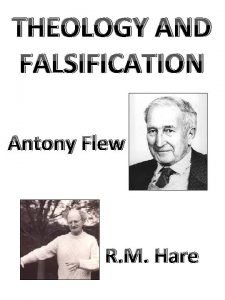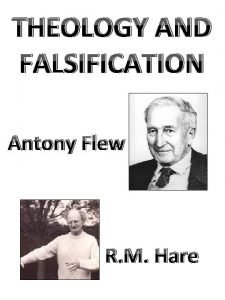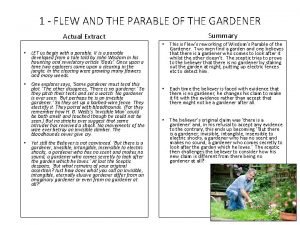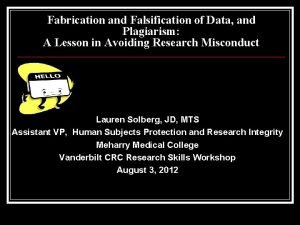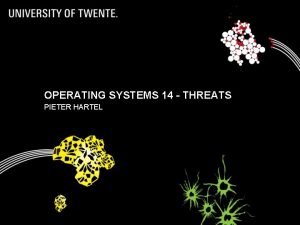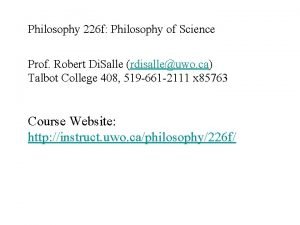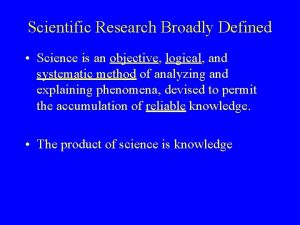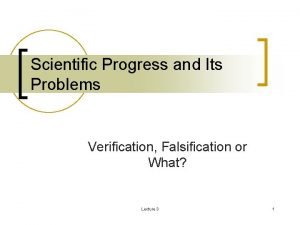THEOLOGY AND FALSIFICATION Antony Flew R M Hare












- Slides: 12

THEOLOGY AND FALSIFICATION Antony Flew R. M. Hare

THEOLOGY AND FALSIFICATION ANTONY FLEW AND R. M. HARE PARAGRAPH 1 - AF • Briefly summarise what Flew is saying in this paragraph. • This is Flew’s reworking of Wisdom’s Parable of the Gardener. Two men find a garden and one believes that there is a gardener who comes to look after it whilst the other doesn’t. The sceptic tries to prove to the believer that there is no gardener by staking out the garden at night, putting up electric fences etc to detect him. • Each time the believer is faced with evidence that there is no gardener, he changes his claim to make it fit with the evidence rather than accept that there might not be a gardener after all. • The believer’s original claim was ‘there is a gardener’ and, in his refusal to accept any evidence to the contrary, this ends up becoming ‘'But there is a gardener, invisible, intangible, insensible to electric shocks, a gardener who has no scent and makes no sound, a gardener who comes secretly to look after the garden which he loves. ‘ The sceptic then challenges the believer to consider how his new claim is different from there being no gardener at all? Whose parable was this originally? John Wisdom’s Who does the ‘Gardener’ represent? God Why, at the end of the paragraph is the sceptic so frustrated with the believer? Because they will not take on board any of the evidence that they are presented with Key words or phrases to look out for so that you can identify which paragraph this is: John Wisdom Gardener

THEOLOGY AND FALSIFICATION ANTONY FLEW AND R. M. HARE PARAGRAPH 2 - AF • • Briefly summarise what Flew is saying in this paragraph. Flew explains his idea of ‘qualification’. He argues that sometimes, people are so convinced by what they consider to be the truth that they will not accept any evidence to the contrary and instead will just change or ‘qualify’ their ideas so that they fit in with any evidence that they are presented with. • Flew calls this ‘death by a thousand qualifications’ and refers to his notion that people end up making their own claims ridiculous when they constantly adjust them to make them fit in with the evidence they are given; for example a simple claim like, ‘There is a gardener’ ends up becoming something ridiculous like, ‘'But there is a gardener, invisible, intangible, insensible to electric shocks, a gardener who has no scent and makes no sound, a gardener who comes secretly to look after the garden which he loves. ‘ What does Flew mean by the term ’picture preference’? An act of imagination What does it mean to ‘qualify’ an idea or statement? To change it to fit in with new evidence What does Flew mean when he says that religious beliefs suffer ‘death by a thousand qualifications’? They become ridiculous when they have to keep being added to. Key words or phrases to look out for so that you can identify which paragraph this is: Aphrodite Sexual behaviour ‘Death by a thousand qualifications’

THEOLOGY AND FALSIFICATION ANTONY FLEW AND R. M. HARE PARAGRAPH 3 - AF • • Briefly summarise what Flew is saying in this paragraph. Flew explains the different ways of interpreting religious language. He explains that liberal interpretations involve considering statements as representing a meaning rather than reporting a fact. For example, the statement ‘God has a plan’ could be interpreted liberally as we must live our lives as if there were a purpose behind them. • Traditional interpretations involve considering statements as being true. For example, the statement ‘God has a plan’ has been traditionally interpreted as there is an all powerful spirit who presides over humanity and determines their lives. • He does not think liberal interpretations are the proper way to view religious language and believes that it would be unpopular with believers themselves. What does it mean to view religious language in a ‘liberal’ sense? To consider statements as representing a meaning rather than reporting a fact. For example, the statement ‘God has a plan’ could be interpreted liberally as we must live our lives as if there were a purpose behind them. What does it mean to view religious language in a ‘traditional’ sense? To consider statements as being true. For example, the statement ‘God has a plan’ has been traditionally interpreted as there is an all powerful spirit who presides over humanity and determines their lives. What does Flew think about the liberal understanding of religious language? He does not think it is the proper way to view religious language and believes that it would be unpopular with believers themselves. Which type of interpretation of religious language does Flew express that he is going to focus on? Traditional Key words or phrases to look out for so that you can identify which paragraph this is: Utterances Crypto-commands Orthodox

THEOLOGY AND FALSIFICATION ANTONY FLEW AND R. M. HARE PARAGRAPH 4 - AF • • Briefly summarise what Flew is saying in this paragraph. This is the key crux of Flew’s argument and what he is basically saying is that if a person will not allow their ideas to be falsified (ie, proved wrong) then these ideas are not based on facts and are therefore meaningless. • He believes that religious assertions are not really assertions at all because believers will not accept any evidence that they may be incorrect, they simply change their claim so that it still fits with the evidence; for example a simple claim like, ‘There is a gardener’ ends up becoming something ridiculous like, ‘'But there is a gardener, invisible, intangible, insensible to electric shocks, a gardener who has no scent and makes no sound, a gardener who comes secretly to look after the garden which he loves. ‘ What does Flew say about statements that don’t deny anything? That they are not really claiming anything either. According to Flew, what is an ‘assertion’? A statement that claims that something is true. Why does Flew think that religious statements cannot count as assertions? Because religious believers will not allow anything to prove their ideas false, they just ‘qualify’ their ideas so that they still fit with the new evidence. Key words or phrases to look out for so that you can identify which paragraph this is: Assertion Negation Denial

THEOLOGY AND FALSIFICATION ANTONY FLEW AND R. M. HARE PARAGRAPH 5 - AF • • Briefly summarise what Flew is saying in this paragraph. Flew gives an example of a child dying from throat cancer, whose father frantically searches for a cure. God, however, "reveals no obvious sign of concern". Yet religious believers say God loves his children just like a father loves his child. Normally, if a father was unconcerned about his child's fatal illness, that would disprove his claim to love his child. • He questions why doesn't God's (apparent) lack of concern disprove the belief that he is a loving Heavenly Father? There's a link here to the Problem of Evil & Suffering. He then considers two probable responses from religious believers; God’s love is not like human love and God’s love is inscrutable. • He concludes by raising the question of how much horror is too much to be compatible with a belief that God loves us? When does the word "love" lose all meaning? Flew doesn't say it explicitly, but his conclusion is that, if a believer maintains a belief in a loving God REGARDLESS of what happens, then that belief is a meaningless belief. Briefly explain the analogy that Flew uses to discredit the idea that God loves us like a father. A child dying from throat cancer, whose father frantically searches for a cure. God, however, "reveals no obvious sign of concern What does Flew think we have to ask ourselves about the existence of evil and suffering? How much evil and suffering is compatible with a belief that God loves us? What does Flew conclude about people who continue to believe in God despite incidences of great suffering? That their beliefs are meaningless Key words or phrases to look out for so that you can identify which paragraph this is: Analogy of the dying child Inscrutable Love

THEOLOGY AND FALSIFICATION ANTONY FLEW AND R. M. HARE PARAGRAPH 6 - RH • • Briefly summarise what Hare is saying in this paragraph. This is Hare’s Parable of the Paranoid Student. Hare tells the story of a student who is convinced that all of his professors are trying to kill him. His friends present him with evidence for why he is mistaken but the student refuses to take it on board and clings to his belief. Why would Flew find the student’s claims meaningless? Because he refuses to allow it to be proved false by the evidence that he is presented with. Why does Hare argue that the student’s claims are meaningful? Because they have an impact on how he sees the world and how he lives his life. What do Hare’s ideas suggest about how he views Flew’s work (see analysis section for paragraph 6). Hare believes that Flew’s ideas about what makes a statement meaningful are too strict. Key words or phrases to look out for so that you can identify which paragraph this is: Lunatic Dons Diabolical cunning

THEOLOGY AND FALSIFICATION ANTONY FLEW AND R. M. HARE PARAGRAPH S 7 AND 8 RH • • Briefly summarise what Hare is saying in this paragraph. Hare explains his idea of bliks. A blik is the way in which someone views the world, for example, sme peoplehave the blik that everything happens for a reason and so when something bad happens to them, they will assume that it is part of ‘grander plan’. A blik is a bit like a gut feeling, it is not based on facts. This means that you can't contradict a blik with more facts. People "cherry pick" the facts that support their bliks and selectively ignore the facts that go against their bliks. Hare's point is that it isn't just lunatics who do this - we all have bliks. • Hare gives the example of his blik about driving being safe. He is aware that car crashes happen, but that doesn't challenge his blik about driving being safe. If he had the opposite blik, he would never get in a car - and no amount of safe journeys would convince him that the very next journey might not be the one that resulted in a horrible accident. • He concludes by reiterating that you cannot disprove a blik with facts as they are not based on facts to begin with. What is a blik? A way in which a person views the world, for example ‘everything happens for a reason’. What does Hare says that we use our bliks to do? Interpret the world. Key words or phrases to look out for so that you can identify which paragraph this is: Blik Analogy of driving a car

THEOLOGY AND FALSIFICATION ANTONY FLEW AND R. M. HARE PARAGRAPH 9 RH • • Briefly summarise what Hare is saying in this paragraph. Hare discusses the work of Hume who argued that all knowledge should be doubted. Hume argued that humans assume that just because something has always happened a certain way in the past, it will continue to do so in the future; he argues that this is an irrational belief. • Hare asserts that bliks are our foundation for how we view the world. He refers to a passage in the Bible, ‘I bear up the pillars of it’ and compares it to the idea that human knowledge is weak but a blik is a bit like God, it provides a foundation for everything, without it, you wouldn’t be able know anything at all. What is Hume famous for Being sceptical What did Hume say that the fundamental flaw with inductive arguments was? That humans assume that just because something has always happened a certain way in the past, it will continue to do so in the future; he argues that this is an irrational belief. Explain the blik of God ‘bearing up the pillars’ A blik provides a foundation for all other knowledge. What does Hare conclude about bliks and proof? Bliks cannot be proved or disproved because they are not based on facts to begin with. Key words or phrases to look out for so that you can identify which paragraph this is: Hume Sceptical Pillars

THEOLOGY AND FALSIFICATION ANTONY FLEW AND R. M. HARE PARAGRAPH 10 RH • • Briefly summarise what Hare is saying in this paragraph. Flew criticises religious statements for not being falsifiable, but Hare's response is that they don't have to be. Only scientific statements need to be falsifiable and Hare has shown that religious statements aren't like scientific statements. Hare asserts that atheists like Flew are guilty of thinking of God as the answer to a scientific problem when he was never meant to be. • Hare gives a final example of bliks in action. He offers the blik that everything that happens, happens by chance. A person with this sort of blik would think that there's no point in planning anything or trying to understand anything. This belief would make a big difference to how you lived your life. Hare thinks that religious belief is like this. A theist's blik says that the world is the creation of a loving God. This can't be verified or falsified, but it makes a difference to how you live your life. How does Hare respond to Flew’s criticism that religious statements are not falsifiable? That this is irrelevant as they are not like scientific statements. Hare acknowledges that bliks cannot be verified or falsified but still believes that they are meaningful, why? Because they have an impact on how a person lives their lives. Key words or phrases to look out for so that you can identify which paragraph this is: French quotes Atlas

THEOLOGY AND FALSIFICATION ANTONY FLEW AND R. M. HARE PARAGRAPH 11 RH • • Briefly summarise what Hare is saying in this paragraph. Hare explains that he believes that all atheists still share common beliefs with theists such as the idea that it is important to be kind. • However, Hare does think that some atheists might genuinely abandon the religious blik. Hare doesn't say it outright, but he implies that this would be a bad step. Hare has already mentioned Hitler and perhaps sees Nazism as one of the "different directions" people might go in when they live the religious blik behind. Hare thinks that the religious blik has kept evil urges restrained, but these will express themselves once the religious blik is abandoned. • Hare finishes with a contrast between Sikhs and Muslims, he says that, although Punjabi Sikhs and Muslims are racially/culturally similar, they are "quite different sorts of people" because their religions involve different bliks. What does Hare suggest about many scholars who consider themselves to be atheists? That they still share bliks with religious believers. What does Hare think might happen if atheists abandon all forms of religious blik? That evil urges, previously supressed by such bliks will show themselves, eg people will give into hatred, prejudice What point is Hare trying to make about Sikhs and Muslims? They are "quite different sorts of people" because their religions involve different bliks. Key words or phrases to look out for so that you can identify which paragraph this is: Primitive Jungle Mussulmans (old fashioned name for Muslims) Sikhs

THEOLOGY AND FALSIFICATION ANTONY FLEW AND R. M. HARE PARAGRAPH 12 RH • • Briefly summarise what Hare is saying in this paragraph. Hare is arguing that religious questions have a direct impact on how a person lives their life whereas the same is not true of scientific ones. It is therefore not appropriate to apply the same rules of ‘what is meaningful? ’ to both disciplines. How does Hare argue that the Parable of the Gardener and that of the Paranoid student are essentially different? The believer in the garden is not really invested in whether or not there is a gardener as it makes no difference to his life. This is in contrast to the student who is personally involved in the question of whether or not his professors want to kill him. Key words or phrases to look out for so that you can identify which paragraph this is: Mention of both parables and Hare’s blik about driving his car Detachment
 Antony flew theology and falsification
Antony flew theology and falsification Antony flew falsification
Antony flew falsification Antony flew falsification
Antony flew falsification Theology of glory vs theology of the cross
Theology of glory vs theology of the cross The parable of the gardener explained
The parable of the gardener explained Crishnal
Crishnal Define fabrication and falsification
Define fabrication and falsification Masquerade falsification and repudiation
Masquerade falsification and repudiation Robert disalle
Robert disalle Pediatric condition falsification
Pediatric condition falsification The falsification principle
The falsification principle What is the characteristics of research
What is the characteristics of research What is falsification theory
What is falsification theory

